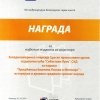Per the decision of the jury, the award for publishers from the Diaspora went to the Western American Diocese of the Serbian Orthodox Church in North and South America and their publishing house "Sebastian press" in the United States for the book "The Christian Heritage of Kosovo and Metohija - the Historical and Spiritual Heartland of the Serbian people" (in English).
This award is equally shared between the Diocese of Western America and the Metropolitanate of Montenegro and the Coastlands and their informative institution "Svetigora" which published the monograph "The Monastery of Cetinje."
Jury chairman Prof. Dr. Dragan Simeunović and members Vesna Kapor, Milica Lilic, Professor Slobodan Kanjevac and Srba Ignjatovic.





